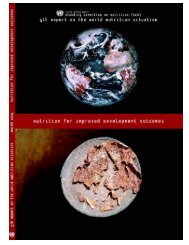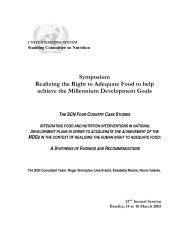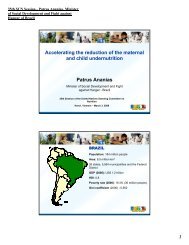Universal Salt Iodization (USI) - FTP Directory Listing
Universal Salt Iodization (USI) - FTP Directory Listing
Universal Salt Iodization (USI) - FTP Directory Listing
- No tags were found...
Create successful ePaper yourself
Turn your PDF publications into a flip-book with our unique Google optimized e-Paper software.
www.unsystem.org/scn FEATURES 5Global Progress in Addressing Iodine Deficiency through <strong>USI</strong>: The Makings of a GlobalPublic health Success Story—The First Decade (1985-1995)Dr Basil S Hetzel (Chairman Emeritus, ICCIDD)Iodine deficiency is the most common preventable cause of brain damage with more than 2 billion people from 130countries at risk. The global problem of iodine deficiency has been redefined by a readily transmitted populationconcept, with an easy acronym – the concept of the iodine deficiency disorders (IDD) – referring to all the effects ofiodine deficiency in a population, that can be totally prevented by correction of iodine deficiency with special emphasison brain damage and not just to goitre and cretinism (1983). This was followed by the creation of the InternationalCouncil for Control of Iodine Deficiency Disorders (ICCIDD) supported by WHO and UNICEF with 700 multidisciplinaryprofessionals from more than 100 countries, committed to providing technical assistance to national programs for theelimination of IDD (1986). The WHO policy of <strong>Universal</strong> <strong>Salt</strong> <strong>Iodization</strong> (<strong>USI</strong>) has been widely adopted which requiresiodization of all food for human and animal consumption by the use of iodized salt (25-40 mg I/kilo). Simple practicalmethods for monitoring – by the measurement of salt iodine and urine iodine were developed and promoted on a largescale with the technical assistance of the ICCIDD.Key words: Brain, ICCIDD, IDD, iodine deficiency disorders, monitoring, salt iodization, <strong>USI</strong>IntroductionIodine deficiency is considered to be the most common cause of preventable brain damage in the world(WHO 1994). The problem arises when people live in an environment where the soil has been leached ofiodine, either due to flooding of river valleys or by high rainfall or glaciation in hilly mountainous areas. Thedeficiency in the soil leads to deficiency in all forms of plant life including cereals, grown in the soil. Hencelarge populations living in systems of subsistence agriculture particularly in the developing countries, as in thegreat river valleys of Asia, are locked into the risk of iodine deficiency (Hetzel 1989).Iodine is an essential element for human and animal development because it is a constituent of the thyroidhormones, thyroxine (T 4 ) and triiodo-thyronine (T 3 ). In a person affected by iodine deficiency, as the thyroidgland tries to maintain the level of thyroid hormones in the blood, it enlarges to form a goitre. But eventually itfails to maintain the hormone levels, with damaging effects on the development of the brain and other organs.The relation between iodine deficiency and brain damage was originally proposed after studies showed theassociation between goitre and mental retardation (endemic cretinism). Later there was controversy aboutwhether cretinism was related to iodine deficiency, until a controlled trial with iodized oil in Papua NewGuinea established that cretinism could be prevented by correction of iodine deficiency before pregnancy(Pharoah et al 1971, Lancet Editorial 1972). The apparent spontaneous disappearance of cretinism in Europewas attributed to ‘silent’ correction of iodine deficiency by gradual dietary diversification together with thegradual use of iodine supplements associated with economic and social development (Burgi et al 1990).Studies with animal models (sheep, marmoset monkey, rat) confirmed that iodine deficiency causedretardation of foetal brain development (Hetzel and Mano 1989). The combination of the controlled trial andthe results of the studies in animal models clearly established that prevention of brain damage could beachieved by correction of iodine deficiency before pregnancy.Iodine Deficiency Disorders (IDD)The results of the research required a re-conceptualization of the effects of iodine deficiency from thecommon lump in the neck (goitre) to include a spectrum of consequences. These include stillbirths as well asneonatal and other types of hypothyroidism, but the most important effect is that of foetal brain damage. Tothis end, the term iodine deficiency disorders (IDD) was proposed (Hetzel 1983) supported by a LancetEditorial (1983) and has since been generally adopted throughout the world, including adoption by theChinese without translation. The term IDD refers to all effects of iodine deficiency on growth and developmentin a human and animal population, which can be prevented by correction of the deficiency. Effects on brainfunction occur at all stages of life, from foetal damage to the effects of hypothyroidism in the neonate, child oradult (Table 1).back to contents SCN NEWS # 35







